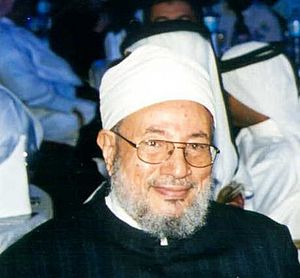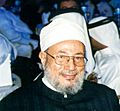Yusuf al-Qaradawi facts for kids
Quick facts for kids Sheikh Prof. Dr.Yusuf 'Abdullah al-Qaradawi يوسف عبد الله القرضاوي |
|
|---|---|

Yusuf al-Qaradawi in 2006
|
|
| Religion | Islam |
| Denomination | Sunni |
| Alma mater | Al-Azhar University (Cairo, Egypt)
|
| Personal | |
| Born | Yusuf 'Abdullah al-Qaradawi 9 September 1926 Saft Turab, Kingdom of Egypt |
| Died | 26 September 2022 (aged 96) Doha, Qatar |
| Children | Abdul Rahman Yusuf Ilham Al-Qaradawi |
| Senior posting | |
| Title | Sheikh |
| Religious career | |
| Works | Fiqh al-Zakat, al-Halal wa al-Haram fi al-Islam, Fiqh al-Jihad, Fiqh al-Awlawiyyat, Fiqh al-Dawlah, Madkhal li-Ma'rifat al-Islam and others |
| Influenced | Rashid Al-Ghannushi, M.A.M. Mansoor |
| Website | al-qaradawi.net |
Yusuf al-Qaradawi (born September 9, 1926 – died September 26, 2022) was an important Islamic scholar from Egypt. He lived in Doha, Qatar. He was the chairman of the International Union of Muslim Scholars.
He was inspired by many earlier scholars. These included Ibn Taymiyya and Hassan al-Banna. He was famous for his TV show "Sharia and Life" on Al Jazeera. This show reached millions of viewers worldwide. He also helped start IslamOnline, a website where he was the main religious scholar.
Al-Qaradawi wrote over 120 books. Two of his well-known books are The Lawful and the Prohibited in Islam and Islam: The Future Civilization. He won eight international awards for his work in Islamic studies. Many people considered him one of the most influential Islamic scholars of his time. He played a big role in the ideas of the Muslim Brotherhood. However, he said he was no longer a member of the group.
Contents
Life Story
Early Life in Egypt
Yusuf al-Qaradawi was born in 1926. His village, Saft Turab, was in the Nile Delta region of Egypt. He came from a poor family of Muslim farmers.
He became an orphan at age two when his father passed away. His uncle then raised him. By the time he was nine years old, he had memorized the entire Quran.
He later joined the Institute of Religious Studies in Tanta. He studied there for nine years. While in Tanta, he met Hassan al-Banna, who started the Muslim Brotherhood. Al-Qaradawi said this meeting had a lasting impact on him.
After Tanta, he studied Islamic Theology at Al-Azhar University in Cairo. He graduated in 1953. He earned a diploma in Arabic Language and Literature in 1958. In 1960, he received his master's degree in Quranic Studies.
In 1962, Al-Azhar University sent him to Qatar. He became the head of the Qatari Secondary Institute of Religious Studies. He finished his PhD in 1973. His thesis was about zakat and how it helps solve social problems.
He was imprisoned several times in Egypt. This was due to his connection with the Muslim Brotherhood. He left Egypt for Qatar in 1961. He did not return until the 2011 Egyptian revolution.
Work in Qatar
In 1977, he helped start the Faculty of Sharia and Islamic Studies at the University of Qatar. He became the dean of this faculty. He also founded the Centre of Seerah and Sunna Research that same year.
He worked in Egypt for a short time. Then he returned to Doha as Dean of the Islamic Department at Qatar University. He stayed there until 1990. He also worked in Algeria for a year. Later, he came back to Qatar as Director of the Seerah and Sunnah Center.
In 1997, Al-Qaradawi helped create the European Council for Fatwa and Research. This group of Muslim scholars writes religious opinions (fatwas) for Muslims living in Western countries. He was the head of this council. He also led the International Union for Muslim Scholars (IUMS).
In 2010, he was recognized as one of the world's leading public thinkers. He ranked third in a poll by Prospect Magazine and Foreign Policy.
Return to Egypt in 2011
After the 2011 Egyptian revolution, Al-Qaradawi visited Egypt for the first time since 1961. He led Friday prayers in Tahrir Square on February 18. More than two million Egyptians attended.
He spoke to both Muslims and Coptic Christians. He said the Egyptian people were like a "genie" freed from a lamp. He asked for the release of political prisoners. He also praised the Copts for protecting Muslims during prayers. He called for the new military leaders to quickly restore civilian rule.
Family Life
Al-Qaradawi was born in Egypt but lived in Qatar. He had three sons and four daughters. Three of his children earned doctorates from universities in Britain.
His daughter, Ilham Al-Qaradawi, is a well-known nuclear scientist. His son, Abdul Rahman Yusuf, is a poet and a political activist.
Awards and Recognition
Al-Qaradawi received many awards for his contributions to Islamic society. Some of these include:
- The Islamic Development Bank (IDB) Prize in Islamic Economics – 1991
- King Faisal International Prize for Islamic Studies – 1994
- Sultan Hassanal Bolkiah (Sultan of Brunei) Award for Islamic Jurisprudence – 1997
- Sultan Al Owais Award for Cultural & Scientific Achievements – 1998–1999
- Dubai International Holy Quran Award for Islamic Personality of the Year – 2000
- The State Acknowledgement Award from the Government of Qatar – 2008
- Tokoh Ma'al Hijrah award by the Malaysian Government – 2009
In 2009, the Qatar Faculty of Islamic Studies started the "Sheikh Yusuf Al Qaradawi Scholarships." They give these scholarships to five students each year for advanced studies. They also named their new research center after him. It is called The Qaradawi Center for Islamic Moderation and Renewal.
He was also a trustee of the Oxford Centre for Islamic Studies.
Books and Writings
Al-Qaradawi wrote over 120 books. His writing style was known for being clear and objective. His most famous book is The Lawful and Prohibited in Islam. Many scholars said that every Muslim family should own a copy of it.
Fiqh al-Zakat
His book Fiqh al-Zakat is seen as a very complete work on the topic of zakat. Zakat is a form of charity in Islam. Scholar Abul Ala Maududi called it "the book of this century in Islamic jurisprudence."
Another scholar, Muhammad Taqi Usmani, praised the book. He said it was a great service to the second pillar of Islam. He noted how it helped apply zakat rules for individuals and groups today.
Fiqh al-Jihad
His book Fiqh al-Jihad talks about the concept of jihad. In this book, Qaradawi suggests a "middle way" for jihad. He says that supporting Palestinians and others facing challenges is a form of jihad. This can be done through solidarity, not just violence.
He also mentions financial jihad, which means giving charity. He believed that modern tools like media and information systems are also part of jihad. He argued that if Muslims can use media to share their message, there is no need to use force.
Images for kids
See also
 In Spanish: Yusuf al-Qaradawi para niños
In Spanish: Yusuf al-Qaradawi para niños
 | Selma Burke |
 | Pauline Powell Burns |
 | Frederick J. Brown |
 | Robert Blackburn |




